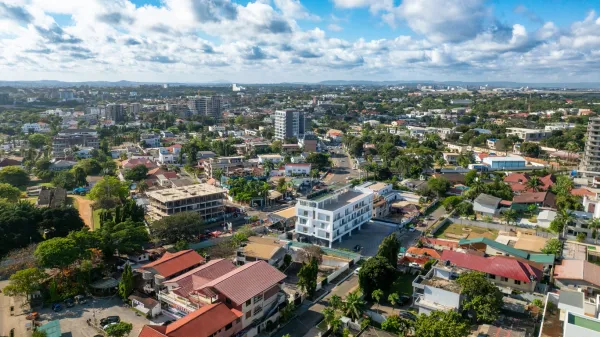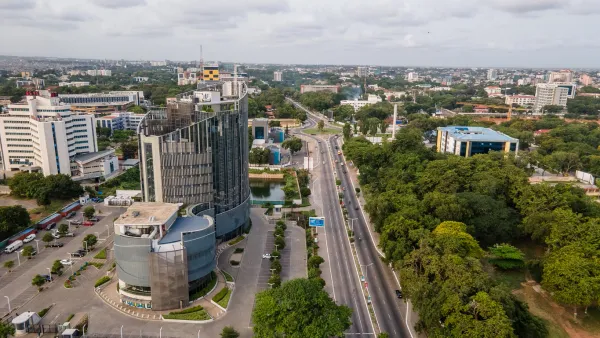Importance of Customer Service
Customer service is crucial in shaping the city's development and economic growth. The quality of service provided has a direct impact on:
- Business success and sustainability
- Citizen satisfaction with public services
- Tourist experiences and recommendations
- Investment attraction and retention
Service Providers in Sekondi-Takoradi
The city's service landscape includes both public and private sectors, creating a complex network of interactions that influence daily life. The Sekondi-Takoradi Metropolitan Assembly (STMA) is responsible for leading public sector service delivery through various initiatives such as:
- Building and development permits
- Business operating licenses
- Marriage registration
- Waste management services
On the other hand, private sector entities contribute to these efforts by providing essential services such as:
- Financial services and banking
- Hospitality and tourism
- Retail and commerce
- Transportation services

Impact on Economic and Social Development
The collaboration between these service providers forms the basis for Sekondi-Takoradi's economic and social development. Local businesses and government agencies strive to meet the increasing demands of a rapidly growing metropolitan area while also preserving the cultural values and community spirit that define the region.
Customer Service in Public Sector
The Sekondi-Takoradi Metropolitan Assembly (STMA) is the main governing body responsible for delivering public services throughout the metropolis. Through its Customer Service Charter, STMA promises to provide fair services to all residents.
Services Offered by STMA
STMA offers a wide range of essential public services:
- Building and development permits
- Business operating licenses
- Food vendor certifications
- Marriage registration
- Waste management solutions
- Vehicle licensing
- Property rate collection
Each service has a specific process with requirements and timelines. The assembly has a standard fee structure that is reviewed annually to ensure affordability for all residents.
Departments Responsible for Service Delivery
The STMA service delivery system operates through dedicated departments:
- Client Service Unit: Your first point of contact for inquiries
- Planning Department: Handles development permits
- Environmental Health Unit: Manages food vendor certifications
- Revenue Department: Processes payments and licenses
Commitment to Transparent Service Delivery
The assembly's commitment to transparent service delivery includes:
- Clear documentation requirements
- Published processing timelines
- Standardized application procedures
- Regular updates on application status
- Direct communication channels with relevant departments
STMA's service framework aims to create an efficient system where residents can access public services without unnecessary bureaucratic obstacles.
Financial Institutions and Customer Service
Financial institutions in Sekondi-Takoradi play a vital role in the economic growth and development of the metropolis. These institutions serve as the backbone of financial transactions, providing essential banking services to both individuals and businesses.
Sekondi Takoradi PENCO stands out as a key player in the region's financial sector, offering:
- Personalized savings accounts
- Business and personal loans
- Mobile banking solutions
- Digital payment services
- Investment opportunities
- Financial advisory services
The institution's customer service approach focuses on creating lasting relationships with clients through:
- Face-to-face consultations
- 24/7 digital banking support
- Quick response times
- Tailored financial solutions
PENCO's commitment to ethical standards shapes their service delivery. They maintain strict confidentiality protocols and transparent fee structures. Their staff undergoes regular training to stay updated on banking regulations and customer service best practices.
Community development remains a priority for financial institutions in the region. Banks actively participate in local initiatives through:
- Financial literacy programs
- Small business support
- Youth entrepreneurship schemes
- Agricultural financing options
These institutions recognize their role extends beyond traditional banking - they serve as partners in the community's economic advancement, helping residents achieve their financial goals while maintaining high service standards.

Hospitality Industry and Customer Service
The hospitality sector in Sekondi-Takoradi faces unique challenges in delivering exceptional customer service. Hotels, restaurants, and entertainment venues struggle to maintain consistent service standards despite the growing tourism potential in the region.
Key Service Issues:
- Long waiting times at restaurants during peak hours
- Inconsistent service quality across different establishments
- Limited staff training in customer service protocols
- Communication barriers between staff and international guests
Recent surveys indicate that 60% of hospitality establishments in Sekondi-Takoradi lack structured customer service training programs. This gap results in varying service experiences, from excellent to subpar, depending on the venue and staff members involved.
Several establishments have received negative reviews citing:
- Delayed response to guest requests
- Unprofessional staff behavior
- Poor complaint handling procedures
- Inadequate communication of service delays
Some leading hotels have implemented service improvement measures:
- Digital queue management systems
- Staff training workshops
- Customer feedback mechanisms
- Service quality monitoring programs
The Ghana Tourism Authority's local office actively monitors service standards through regular inspections and customer feedback channels. Their reports highlight the need for standardized service protocols across all hospitality establishments in Sekondi-Takoradi to enhance the guest experience and boost tourism growth.

Challenges and Improvements
Customer service in Sekondi-Takoradi faces several pressing challenges that require immediate attention:
- Limited Training Resources: Many businesses lack structured training programs for their staff, resulting in inconsistent service delivery
- Language Barriers: Staff often struggle to communicate effectively with international visitors
- Technology Integration: Slow adoption of digital solutions hampers service efficiency
- Cultural Misunderstandings: Gaps between local service traditions and modern customer expectations
The implementation of targeted improvement strategies can address these challenges:
Staff Development Programs
- Regular customer service workshops
- Cross-cultural communication training
- Performance monitoring systems
- Reward programs for exceptional service
Digital Transformation
- Introduction of automated feedback systems
- Online appointment scheduling
- Digital payment solutions
- Real-time service tracking
Community Engagement Initiatives
- Regular customer feedback sessions
- Local business forums
- Public-private partnerships
- Cultural sensitivity training
Transparency remains a critical factor in service improvement. Businesses must adopt clear communication channels, publish service standards, and maintain open dialogue with customers. The STMA's commitment to efficiency drives the implementation of streamlined processes, reducing bureaucratic delays and enhancing service delivery across all sectors.
The Way Forward for Customer Service in Sekondi-Takoradi
The transformation of customer service in Sekondi-Takoradi requires active participation from all stakeholders. Public sector organizations, private businesses, and community members must embrace a customer-centric approach to drive sustainable development.
Key Actions for Stakeholders:
- Implement regular customer service training programs
- Establish measurable service quality standards
- Create feedback mechanisms for continuous improvement
- Invest in modern service delivery technologies
The path to improved living conditions in Sekondi-Takoradi runs through enhanced customer service practices. Your role - whether as a business owner, public servant, or community member - shapes the future of service delivery in our metropolis. Take action today: prioritize customer satisfaction, embrace transparency, and contribute to building a more service-oriented Sekondi-Takoradi.
FAQs (Frequently Asked Questions)
What is the importance of customer service in Sekondi-Takoradi ?
Customer service in Sekondi-Takoradi is vital for enhancing public satisfaction, promoting good governance, and driving regional development by ensuring efficient and transparent service delivery across both public and private sectors.
How does the Sekondi-Takoradi Metropolitan Assembly (STMA) contribute to customer service ?
The STMA contributes through its Customer Service Charter by providing structured procedures and requirements aimed at improving governance and delivering essential public services effectively to the residents of Sekondi-Takoradi.
What role do financial institutions like Sekondi Takoradi PENCO play in customer service ?
Financial institutions such as Sekondi Takoradi PENCO offer banking and financial services with a focus on ethical standards and community development, thereby supporting customer service excellence within the region.
Why is customer service particularly important in the hospitality industry of Sekondi-Takoradi ?
Customer service is crucial in the hospitality industry to ensure guest satisfaction, manage waiting times efficiently, and maintain a positive reputation, although some establishments have faced challenges regarding service quality.
What are the main challenges faced in customer service delivery in Sekondi-Takoradi ?
Key challenges include issues with transparency and efficiency in both public and private sectors, which affect overall customer satisfaction and hinder optimal service delivery.
What strategies are proposed for improving customer service in Sekondi-Takoradi moving forward ?
Strategies emphasize enhancing transparency, fostering community engagement, promoting good governance, and encouraging stakeholders to prioritize customer service as a key driver for improving living conditions and regional development.













Member discussion